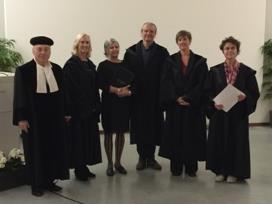Kathie McKinnon
DISSERTATION TITLE:
Intertwining Hope, Strengths, and Resistance as Transformative: Women’s Verbal and Visual Narratives
September 2016
Social construction invites us to engage in meaningful conversations, to be curious about new possibilities, and to co-create alternative ways of being with one another in the world. It counters notions of individualism and nurtures dialogical engagement. It challenges our knowing and certainty, and asks us to embrace un-knowing and un-certainly to co-construct emergent ideas, meaning making, and transformative possibilities in our re-search and future practice. The re-search presented in this dissertation focuses on the confluence of hopes, strengths, resistance, and transformation in the stories and art created by nine co-inquirers, and how their invited conversations, rich in meaning and deeply experiential, illuminated the importance of story and art in therapeutic practice. This narrative of re-search and practice is based not on ‘I the researcher’ but on ‘we the co-inquirers,’ collaboratively co-constructing counter-stories of relational practice for discursive therapeutic space. The stance of relational construction, being-in the discourse of ‘we,’ moved the re-search described in this dissertation into new terrain and un-mapped territory. Our “we-ness,” our collaboration, our dialogical dance of sharing together speaks to our relational de-methodology that considers knowledge as generated in social, relational interactions throughout our learning and meaning making together. The relational de-methodology conceived in this re-search fits well with social construction, as our dialogical moments were sources of emergent knowledge for practice and future re-search. We generated knowledge in discursive dialogical space, co-creating context for re-search and practice. We cultivated curiosity about the confluence of hope, strengths, and resistance, and the transformative fluidity in therapy portrayed through our verbal and visual narratives. The everyday-ness of our conversations encourages multiplicity of voice and deconstructs the power differentials of researcher/researched and of therapist/client. We did this not to defy traditional discourse, knowledge or therapy, but to generate new ways of creating knowledge through a dialogical discursive context. The notion of what counts as research was so strong and so entrenched that there were times it was hard to embrace our de-methodological process. It was difficult sometimes to resist this pull toward traditional research and therapeutic knowing but we did – we opened up multiple dialogues and became progressively more relational in the meaning we made together. De-methodology opened up new ways of doing re-search and new ways of relationally being-with in therapeutic space.

- Dissertation Table of Contents (146.15 KB)
- Dissertation Abstract (50.24 KB)
- Dissertation (6.72 MB)
